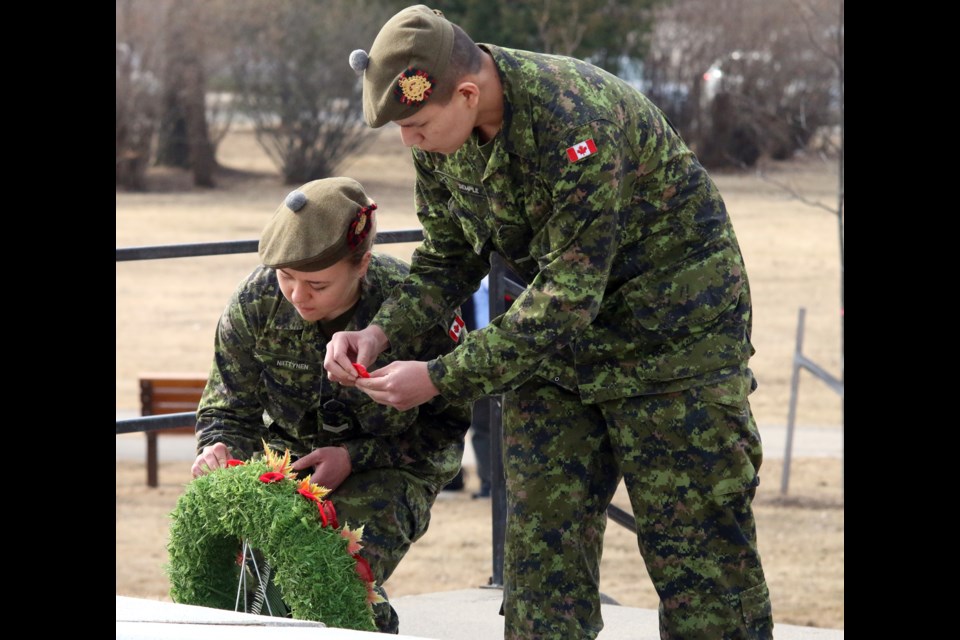THUNDER BAY - In February 1916, recruits with the 52nd Battalion of the Canadian Expeditionary Force landed in France. The next year, the young men from Port Arthur and Fort William would play a key role leading up to the Battle of Vimy Ridge.
One hundred years later, members of the Lake Superior Scottish Regiment, which is the successor of the 52nd Battalion, remembered those who sacrificed their lives for King and country.
“It’s part of the regimental family,” said Cpl. Benjamin Deley. “I think it’s very important that we remember the sacrifices that members of the regiment made and the sacrifices they made for not only themselves and the people here in Thunder Bay, but for Canadian’s and for the security of the free world. The world would have been a very different place if brave men like that didn’t step up and do their job.”
On Sunday, the Lake Superior Scottish Regiment gathered at the Cenotaph at Waverly Park to mark the 100th anniversary of the Battle of Vimy Ridge. A wreath was laid by commanding officer, Lt. Col. David Ratz, which was then adorned with poppies by regimental members and the public.
“We have a fair number of soldiers who fought there and as such it’s important for the soldiers who are currently serving to remember their history and the comrades that went before them,” Ratz said.
According to Ratz, the 52nd Battalion, which fought as part of the 9th Infantry Brigade, 3rd Canadian Division during the First World War, played a key role in the stages leading up to the April 9th battle by gathering reconnaissance on enemy positions.
“They played a part in the formation of the battle,” Ratz said. “Later on when the battle started, they were in reserve and their job was to mop up areas of German resistance, to help bring up ammunition, carry back wounded, and escort prisoners of war.”
During the battle that raged for four days and saw more than 3,500 Canadian’s killed and more than 7,000 more wounded, the 52nd Battalion followed the initial attack, but there was no shortage of destruction and fear on the battlefield.
“We say they are in reserve, it sounds like they are in the back, but these guys are still going over the trenches, they are still going through the mud, there are still shells exploding around them, there is still machine gun fire,” Ratz said.
The Battle at Vimy Ridge was the first time all four Canadian divisions fought together in the First World War and has become a symbol of national pride over the last century.
“It has to do with the fact that through superior training, intelligence, superior planning and logistics, the Canadians were able to capture a fortified position that had alluded the allies for so long during the war,” Ratz said. “Then it became a source of pride for those Canadian soldiers and a source of pride for Canada.”
For 21-year-old Deley, who is the same age as so many who stood in the trenches and braved the shelling and machine gun fire 100 years ago, it’s important to remember what has become a pivotal moment in Canadian history.
“It’s a very important day for our nation’s heritage, not just our military heritage,” he said.
And while Deley has visited Europe and walked former battlefields from the First World War, being able to stand before the Cenotaph in the regiment’s hometown fills him with a sense of pride and duty.
“To be in a place like that, or to be here, makes you think,” he said. “One hundred years ago, people like me, brothers in my regiment, we would have been asked the same thing.”
Ratz said soldiers often look to their peers for a sense of pride and trust when conducting operations, and being able to look into the past, to those who came before and performed the same duty, helps solidify that trust and a sense of identity.
“You belong to something bigger,” he said. “Having that sense of identity and belonging, a sense of family, is very important. And knowing you had ancestors who fought at battles like Vimy Ridge, I think that’s a real source of pride.”
